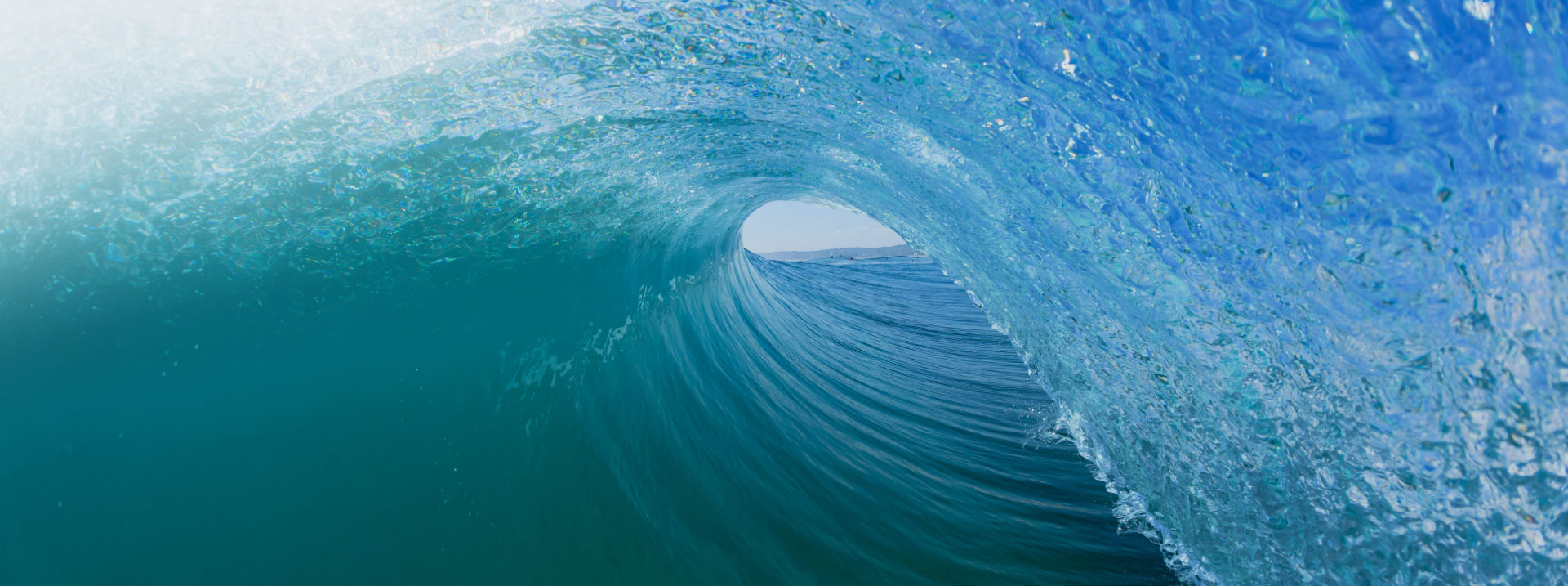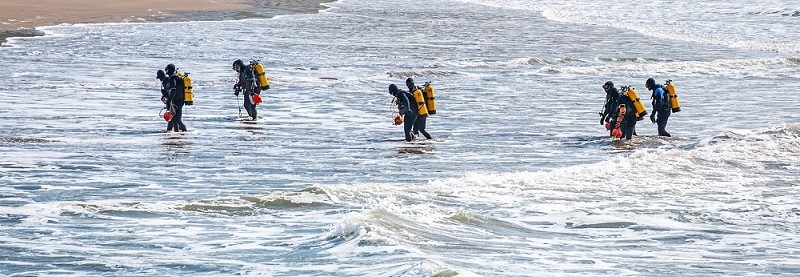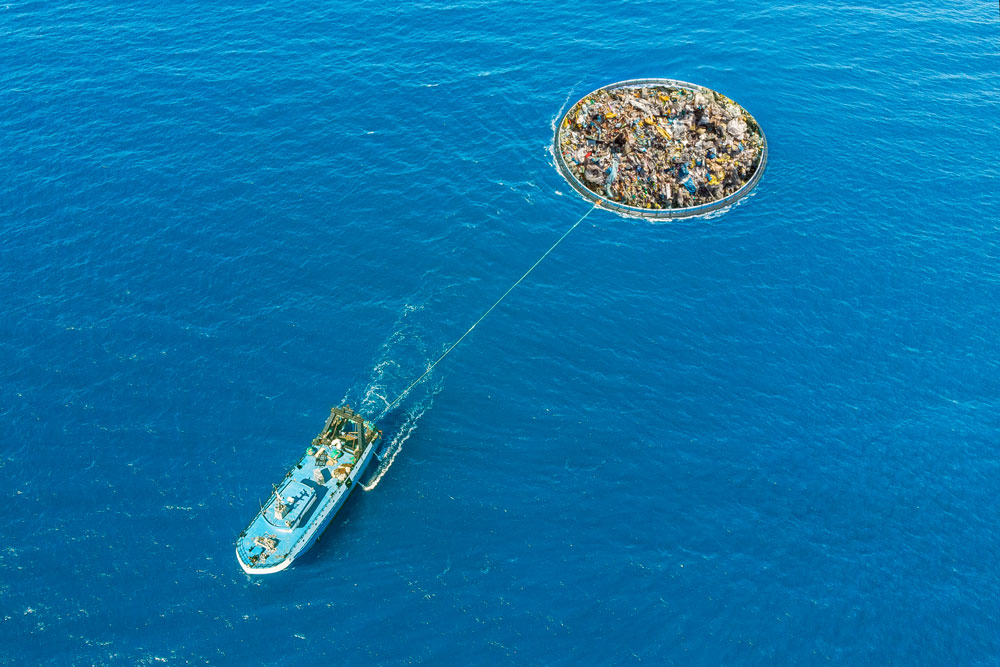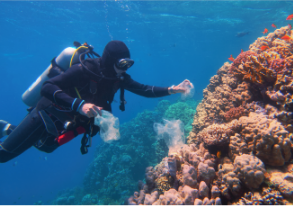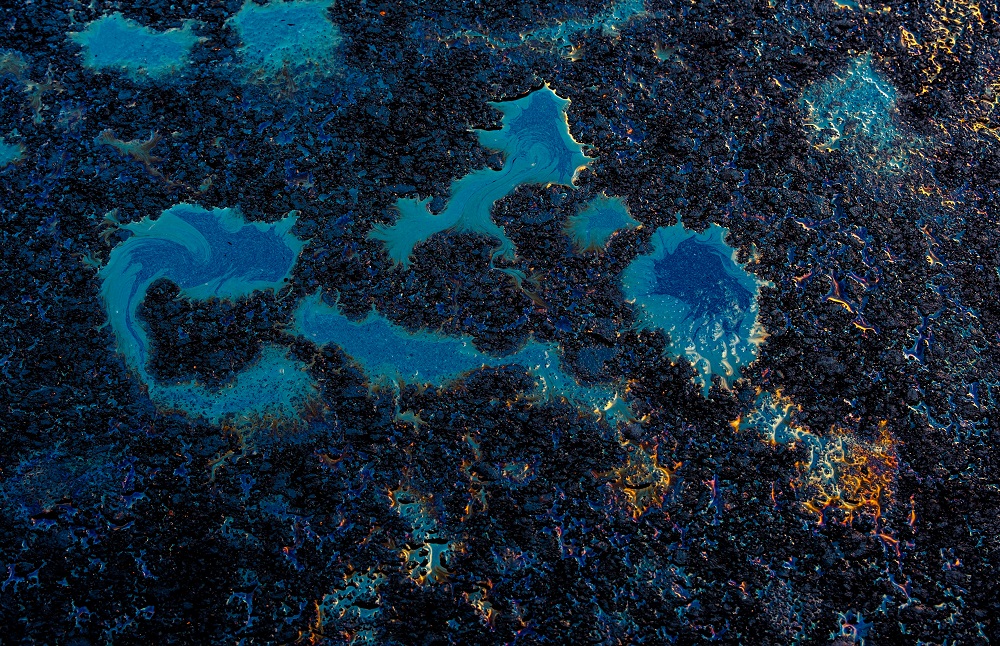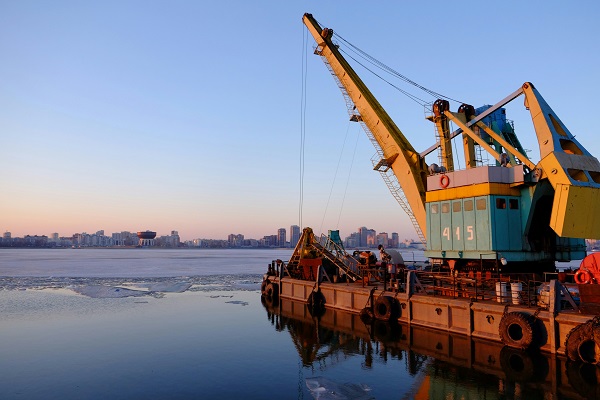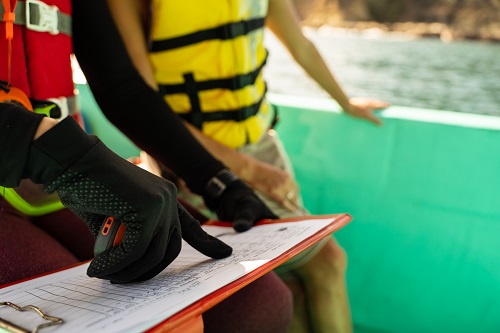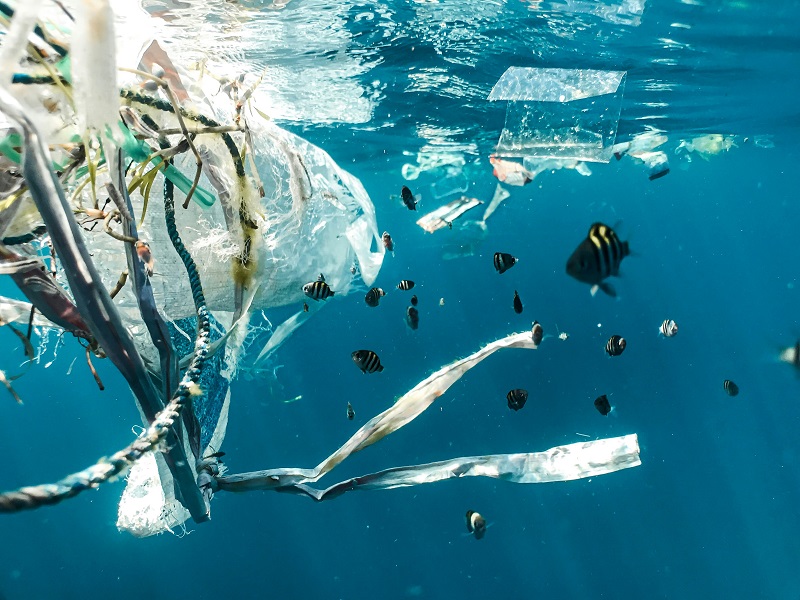A roadmap to address ocean pollution
Ocean pollution is a complex problem. It threatens ecosystems, human health and economies, but a lack of data about its impact means relatively little is being done to prevent and address it.
Over two years, Back to Blue brought together hundreds of stakeholders from across the UN system, science, industry, policy, business and finance to understand ocean pollution and how to tackle it. The roadmap is a synthesis of this work.
The roadmap sets out an ambitious, strategic framework for a global group of stakeholder organisations to build a comprehensive evidence base about the impact of ocean pollution. It is designed to spark action to achieve the vision of a global ocean free from the harmful impacts of pollution by 2050.
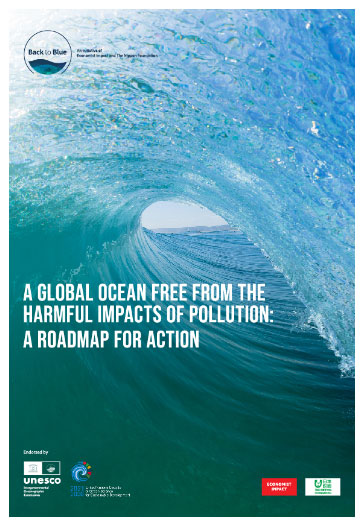
Download the roadmap
A global ocean free from the harmful impacts of pollution: Roadmap for action
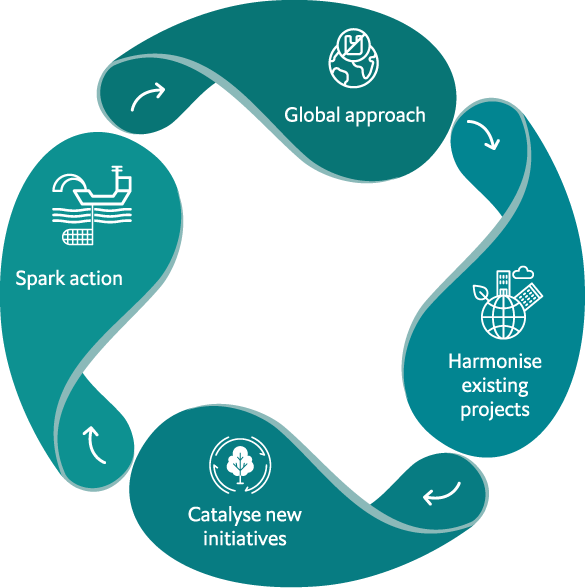
The objective
Pollution, climate change, and nature loss together constitute a deeply intertwined ‘triple planetary crisis,’ yet pollution is the forgotten third of the triangle. This complexity means that, despite the potentially catastrophic impact of pollution on the ocean, our collective knowledge about its extent and its effect on marine ecosystems is extremely limited. Data that is available primarily focuses on coastal areas of large, wealthy nations. It is not possible to create a global ‘map’ of ocean pollution nor draw robust conclusions about the combined and cumulative impact of pollutants on ocean health—or of the interdependencies between climate change and nature loss in the ocean.
Curb the impact of pollution on the ocean
A vision this sweeping is beyond the remit of any single organisation to realise. A collaborative effort at a global scale is required to bring the evidence together that will curb the impact of pollution on the ocean.
This roadmap presents a strategic route to meeting what is a key challenge of the UN Decade of Ocean Science for Sustainable Development, proposing radical reform of our approach to the prevention of marine chemical pollution. I commend Back to Blue for the roadmap proposal and call on those concerned with preventing marine chemical pollution to give it their fullest attention.
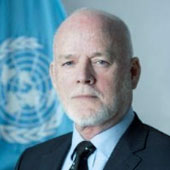
Peter Thomson
UN secretary-general’s
special envoy for the ocean
A Global Ocean Free of the Harmful Impacts of Pollution: A Roadmap for Action, sets out a pathway to close these data gaps by amplifying and connecting the activities of the many organisations working to address ocean pollution to build a global and holistic evidence base about the impact and extent of ocean pollution.
How to take action
Ocean pollution poses a threat to ecosystems, human health and economies. The United States stands to lose $838m in annual fisheries revenue just from the impact of nutrient pollution in the Gulf of Mexico, but this is just one example. The total cost to the global economy is likely to be much greater, and it is set to increase. But a lack of data about ocean pollution means governments don’t have the evidence they need to regulate and manage the problem. What’s more, the interdependencies between ocean pollution on the one hand, and climate, nature and plastic on the other, means that better data on ocean pollution may help governments address these environmental crises.
What policymakers and governments can do now:
- Support and invest in the adoption of the roadmap. This may mean committing funding or joining as an implementation partner.
- Use the 2025 UN Ocean Conference as a key moment to raise and advocate for ocean pollution - beyond plastics - as a critical issue on the international ocean policy agenda.
- Review, and commit to improve, your domestic collection of ocean pollution data. Ensure that data is shared freely with scientists and other stakeholders, and commit to funding long-term and large-scale monitoring.
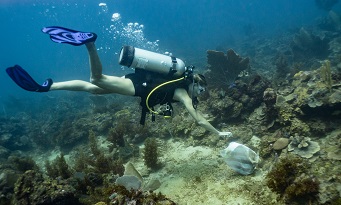)
An astonishing number of UN agencies collect or manage data related to ocean pollution, yet these efforts are largely uncoordinated. In 2024, almost halfway through the United Nations Decade of Ocean Science, it is still nearly impossible to get a clear picture of the extent of ocean pollution and its impact on ocean ecosystems, human health and economies. At this stage, the decade’s challenge to ‘understand and beat marine pollution’ looks unlikely to be met. A harmonised effort across the UN system would rapidly accelerate progress.
What UN agencies can do now:
- Lead the adoption of the roadmap. Step forward to become a coordinating body or host of one of the four stakeholder groups. Join as an implementation partner.
- Use the 2025 UN Ocean Conference as a key moment to raise ocean pollution - beyond plastics - as a critical issue on the international ocean policy agenda. Advocate for member states or donors to support the adoption of the roadmap.
- Review, and commit to improve, your own agency’s collection of ocean pollution data. Ensure that data is shared freely with scientists and other stakeholders, and commit to long-term and large-scale monitoring.
)
Pollution, climate change, and nature loss together constitute a deeply intertwined ‘triple planetary crisis,’ yet pollution is the forgotten third of the triangle. Businesses and investors increasingly consider climate- and nature-related risks, including regulatory and other transition risks. Yet, few have begun to grapple with the impact their business, portfolio or supply chain has on ocean pollution. Opportunities abound too; innovations in data collection and analysis will be critical.
What business leaders and investors can do now:
- Support and invest in the adoption of the roadmap. This may mean committing funding or joining as an implementation partner.
- Review, and commit to improve, your organisation’s collection of ocean pollution data. Ensure that data is shared freely with scientists and other stakeholders.
- Transparently disclose the impact your operation, portfolio or supply chain has on ocean pollution.
- Join industry and investor groups committed to finding solutions to tackle ocean pollution; invest in developing less polluting products and processes.
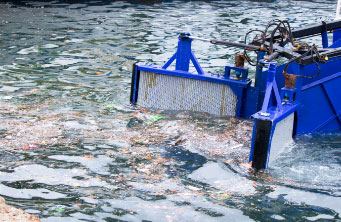)
Some pollutants, such as solid plastics and nutrients, are widely studied. There is little to no data available for most others. Data on ocean pollution is overwhelmingly focused on coastal areas, mostly around large and wealthy countries. Minimal data is collected about the impact of pollution in the open ocean or around Global South countries. Perhaps most critically absent is large-scale time series data about ocean pollution over the long term.
What scientists, universities and data collection agencies can do now:
- Support and invest in the adoption of the roadmap. This may mean joining as an implementation partner or playing a more active leadership role in the taskforce.
- Use the 2025 UN Ocean Conference as a key moment to advocate for ocean pollution as a critical issue on the international ocean agenda.
- Review, and commit to improve, your own organisation’s collection of ocean pollution data. Ensure that data is shared freely with other stakeholders, and commit to funding long-term and large-scale monitoring.
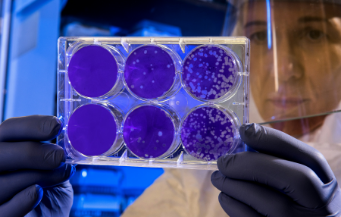)
Plastic is not the only pollution harming the ocean, yet it is the most visible. Widespread action to tackle ocean pollution will be unlikely unless the issue is more widely understood by policymakers, business leaders, media and the public.
What NGOs, foundations, advocates and citizens can do now:
- Support and invest in the adoption of the roadmap. This may mean committing funding or operational support for UN agencies to lead the coordinated effort to implement the roadmap, or joining as an implementation partner.
- Use the 2025 UN Ocean Conference as a key moment to raise and advocate for ocean pollution - beyond plastics - as a critical issue on the international ocean policy agenda.
- Make the invisible visible. Campaign for decision-makers in government and the private sector to invest in long-term monitoring of ocean pollution and commit to sharing the data widely.
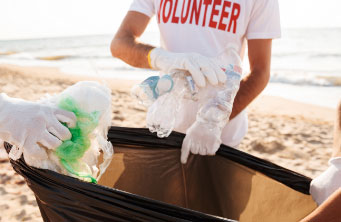)
This roadmap considers ocean pollution’s impact across three dimensions
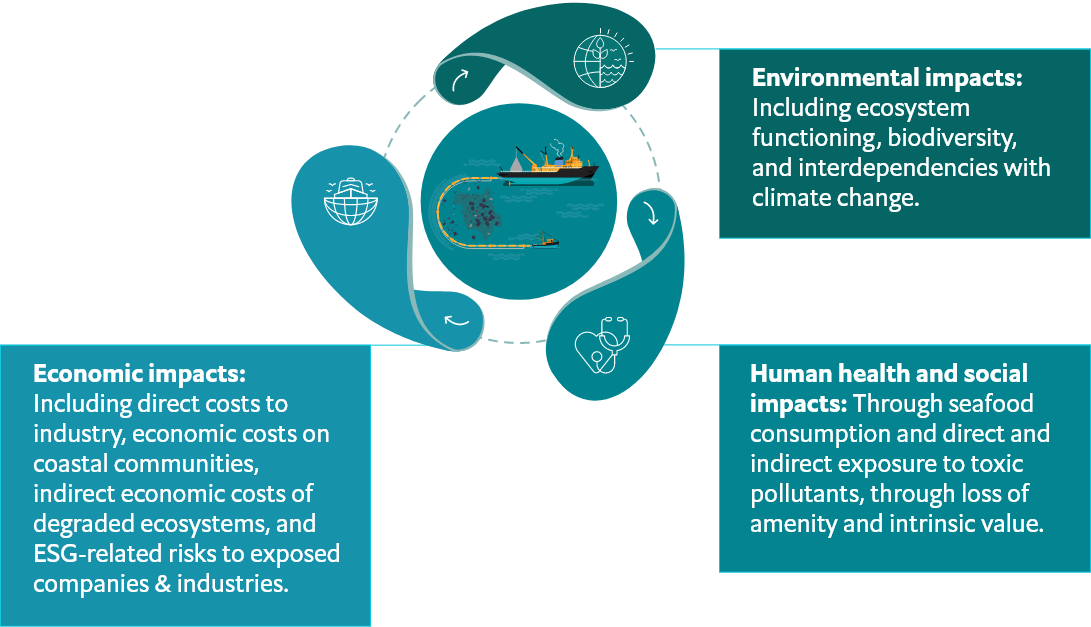
A framework for achieving the vision
- A comprehensive review of all available evidence about ocean pollution. This will involve knitting together existing datasets using AI and other technologies, and drawing conclusions about pollution’s impact on the ocean,
- An analysis of data gaps, including a strategy for closing them, identifying priority areas for action and agreeing to globally consistent monitoring, data collection, storage and sharing protocols,
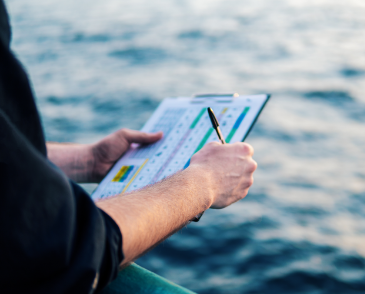
- An analysis of solutions to address and prevent the negative impacts of marine pollution, including recommendations on how public and private-sector stakeholders (including policymakers, businesses and financial institutions) can successfully enact solutions.
- A voluntary coalition of decision-makers from the public and private sectors and other stakeholders have collaboratively developed a global strategy to understand and beat marine pollution.
- A wide range of stakeholder organisations can access ongoing funding from government, philanthropic and private-sector sources to collect and analyse data about the impact of ocean pollution.
- Large-scale and ongoing monitoring of marine pollution means creating a comprehensive evidence ‘map’ of ocean pollution and deducing trends is possible,
- Data about the impacts of marine pollution and the efficacy of solutions to combat its negative impacts is comprehensive and widely available,
- Where data gaps exist, a strategy is in place to close them.
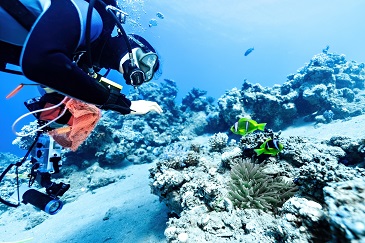
- A growing cohort of public and private-sector stakeholders are enacting solutions to prevent and address the impacts of ocean pollution, including.
- Policy and regulation,
- Voluntary and mandated changes in corporate behaviour,
- Public and private sector investment in innovation and technology.
- A growing cohort of public and private sector stakeholders and organisations are working collaboratively to monitor the impacts of ocean pollution and enact and test solutions to prevent and address it.
- Sustainable, ongoing funding is available for widespread global monitoring of ocean pollution and its impacts,
- There is substantial and growing investment in solutions to prevent and address the impacts of marine pollution.
- Monitoring of marine pollution is ongoing and widespread; the vast majority of data gaps have been closed,
- The most relevant and critical information to inform decision-making about solutions is widely available.
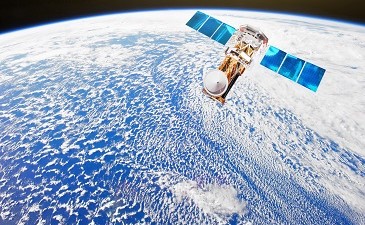
- Action to prevent the negative impacts of ocean pollution is widespread across public and private sector actors.
- Action to prevent the negative impacts of ocean pollution is widespread across public and private sector actors.
- Sustainable, ongoing funding is available for widespread global monitoring of ocean pollution and its impacts,
- There is substantial and growing investment in solutions to prevent and address the impacts of marine pollution.
Achieving this shared vision will require a step-by-step process to close the data gap, implement and assess solutions, engage an ever-wider group of stakeholders, and critically, attract the investment required to fund these activities.
Guiding Principles
- A partnership of partnerships
- Multidisciplinary, multi-stakeholder effort
- Balance of impact and breadth
- Open, interoperable data
- Equitable and inclusive

Naka Kondo
Lead editor and Head of content for Back to Blue Initiative
Asia Lead, Policy & Insights for Economist Impact
Roadmap recommendations
To achieve the vision of a global ocean free from the harmful impacts of pollution by 2050, this roadmap recommends establishing:
Existing projects to close the marine pollution data gap are fragmented, sometimes overlapping and rarely interoperable. A global, multi-stakeholder task force would provide strategic vision, lead coordination between implementation partners, and ultimately be responsible for coordinating stakeholders to achieve the objectives.
A coordinating organisation will be required to host the task force and secretariat. The Intergovernmental Oceanographic Commission of UNESCO (IOC UNESCO) or the United Nations Environment Programme (UNEP) or a collaboration of the two agencies could potentially be the lead coordinator. The task force should be a programme of the UN Ocean Decade.
The task force should:
- Include representatives of the natural and social sciences, encompassing not just marine science but other related areas, including freshwater pollution, climate science and biodiversity.
- Include end-users of ocean pollution data, representing both the public sector (policy, regulatory and standard-setting) and the private sector (industry and investors).
- Be globally representative and inclusive.
- Include other ocean stakeholders, such as coastal communities.
- Be composed of high-level and influential individuals who can represent the task force and advocate for its work in national and international fora.
The coordinating task force should oversee the publication of a comprehensive Global Ocean Pollution Assessment and Action Plan which is updated every five years.
The Global Ocean Pollution Assessment and Action Plan (GOPAAP) should facilitate adaptive decision-making in both government and the private sector, consolidating granular data sources into a comprehensive overview of the ocean and linking pollution impacts to their sources and causes. The inaugural assessment must include a gap analysis and recommendations for how science could fill these gaps over a decadal or two-decadal period. A clear, coordinated, global strategy for this will be vital. Over time, the report should transition to focus on monitoring and verifying solutions.
The GOPAAP should substantially contribute to and catalyse the achievement of a global ocean free of the harmful impacts of pollution by 2050. It should align with and complement existing scientific surveys, treaties as well as freshwater and land pollution data. Its contents may include:
- A global census of ocean pollution.
- An analysis of data gaps and a strategy to fill them.
- An examination and assessment of solutions to address the impacts of ocean pollution.
- Tactics to engage public and private sector stakeholders as end-users of the GOPAAP.
- Tactics to promote and enable investment and funding to address ocean pollution.
While the task force is responsible for coordination, a network of independently operated and funded projects, initiatives, and organisations should implement much of the programmatic work. The scale of the task is too great for any single initiative.
Implementation partners may include UN agencies or bodies, government and regional agencies or bodies, NGOs, universities, philanthropic organisations, for-profit companies and investors among others.
The coordinating task force should issue guidance, best practices, capacity building support or other information that would assist independent implementation partners in achieving the vision of a global ocean free of the harmful impacts of pollution by 2050.
A coordinating body, potentially the IOC UNESCO, UNEP, or a collaboration of the two agencies, should host the secretariat, which should:
- Produce and publish the Global Ocean Pollution Assessment and Action Plan.
- Coordinate and support independent stakeholder groups and implementation partner.
- Provide capacity development for global South partners and coastal communities.
- Undertake capacity assessments and make recommendations for increasing the capacity of stakeholders in each GOPAAP.
- Support the coordinating task force to secure sustainable funding.
- Disseminate information, provide training, and support capacity building for government and non-government agencies.
- Maintain a focus on inclusive and equitable project rollout.
- Lead or commission a global communications campaign to engage the public, using storytelling to catalyse action.
Download A global ocean free from the harmful impacts of pollution: A roadmap for action
Back to Blue is an initiative of Economist Impact and The Nippon Foundation
Back to Blue explores evidence-based approaches and solutions to the pressing issues faced by the ocean, to restoring ocean health and promoting sustainability. Sign up to our monthly Back to Blue newsletter to keep updated with the latest news, research and events from Back to Blue and Economist Impact.
The Economist Group is a global organisation and operates a strict privacy policy around the world.
Please see our privacy policy here.
THANK YOU
Thank you for your interest in Back to Blue, please feel free to explore our content.
CONTACT THE BACK TO BLUE TEAM
If you would like to co-design the Back to Blue roadmap or have feedback on content, events, editorial or media-related feedback, please fill out the form below. Thank you.
The Economist Group is a global organisation and operates a strict privacy policy around the world.
Please see our privacy policy here.


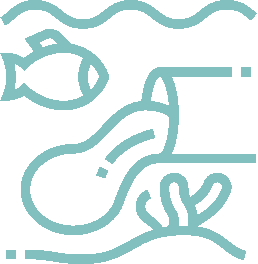

 The scourge of untreated wastewater
The scourge of untreated wastewater Slowing
the chemical tide: safeguarding human and ocean health amid
chemical pollution
Slowing
the chemical tide: safeguarding human and ocean health amid
chemical pollution Hazardous chemicals in plastics - the discussions at INC
Hazardous chemicals in plastics - the discussions at INC


